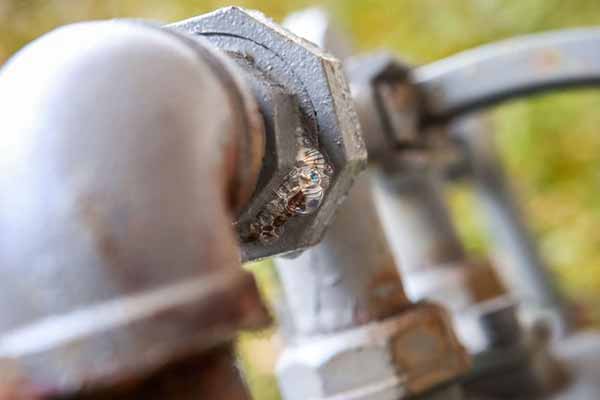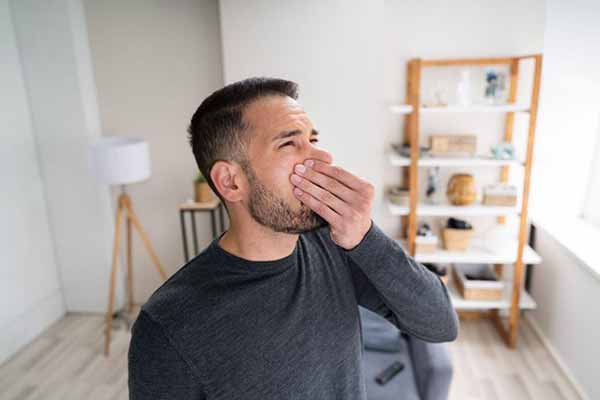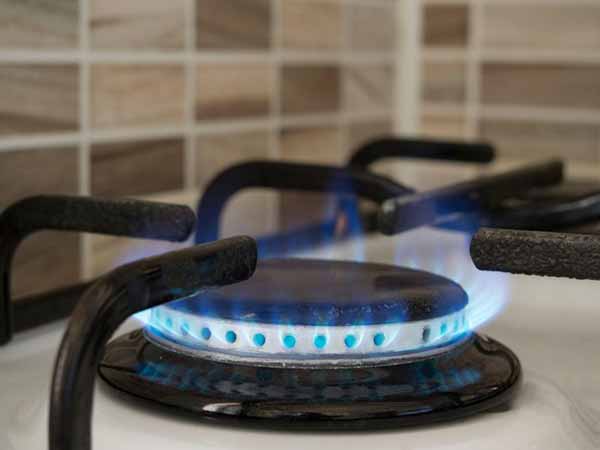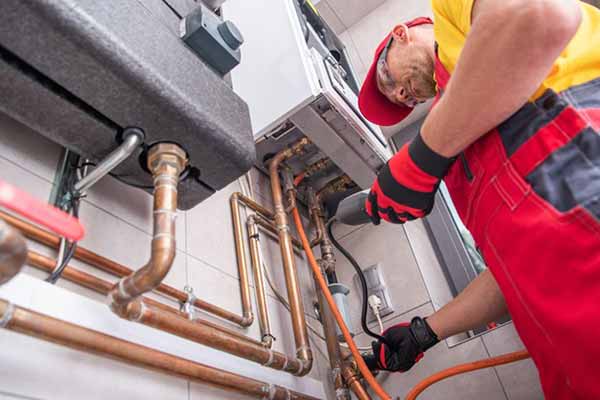From cooking and regulating home temperature to manufacturing and producing chemicals, natural gas is a primary energy source for individuals and businesses alike. While not a renewable energy, natural gas as an energy source produces less carbon emissions than fossil fuels like coal and oil. However, hazards like gas leaks are a real risk with this form of energy.
Natural gas contains methane, a greenhouse gas that harms people and animals when inhaled in large volumes. For this reason, you should prevent gas leaks at all costs.
This article answers your FAQs on why gas leaks occur and how you can detect them inside your house as well as outdoors. You’ll also learn which measures to take and avoid when discovering a gas leak and receive advice for ensuring natural gas safety.
Why Do Gas Leaks Occur?
Gas leaks often result from incorrectly fitted, poorly maintained, or faulty gas pipes and household appliances. If you don’t install your appliances properly, gas can leak from the seals or hoses connecting the cooker, boiler, HVAC system, stove, or other instruments to your area’s gas pipes and gas pipelines.
How Do You Detect a Gas Leak in Your Home?
Suspect a gas leak in your home? You can utilize four factors to help identify a potential risk.
Smell
If you think your house is experiencing a gas leak, you need to investigate the matter immediately by determining if there is an unpleasant smell.
Because natural gas is odorless, it’s mixed with a compound called mercaptan before entering your home. Mercaptan allows homeowners to detect gas leaks as soon as they occur. Should a gas leak occur, a rotten egg odor in the vicinity of the leaking gas pipe or gas appliance should be present.
Listen
A hissing sound might also come from the leaky gas pipe, appliance, or gas meter. The sound may be faint, so try to block out any other noise that could prevent you from detecting the gas leak.
See
A dusty cloud could be close to the gas line, indicating a rupture. The gas pipes might also show visible damage.
If the flames on your appliance are yellow or orange rather than blue, this could indicate a gas leak. Also, keep an eye on your appliances’ pilot lights. If these small flames often blow out or flicker, there might be an issue.
In other areas of the house, your houseplants might look stressed and dull due to the lack of oxygen should your house have a small, ongoing gas leak.
Long-term gas leaks will also affect your utility bill. You might find that you pay more than usual toward gas. Pay attention to your gas meter reading and account to ensure that it remains consistent with your usage.
Feel
Overexposure to gas can cause physical symptoms in people and animals. If you, your family, or your pets experience episodes of vomiting, nausea, or drowsiness, it could be a sign of a gas leak.
How Do You Detect a Gas Leak Outside?
It’s also possible for gas leaks to occur outside of your house. There might be a gas leakage if you notice brown grass or dead plants around outdoor or underground gas pipes. Exposure to methane causes outdoor plants to wilt or die, just like indoor plants will during a gas leak.
There might also be a gathering of insects around the area as the smell of mercaptan attracts bugs like spiders.
If you suspect an underground gas leak, don’t dig around your yard in an attempt to locate the leak. Contact your local gas company or plumber to investigate.
What Happens if You Leave a Gas Stove On?
Faulty gas pipes and appliances are not the only causes of natural gas leaks. Should you accidentally leave your gas stove on, even without a flame, it will leak gas into the kitchen and spread throughout your house. Ensure you turn off the gas stove after cooking to avoid safety hazards such as poisoning from carbon monoxide.
What Is the First Action to Take During a Suspected Gas Leak?
Once you have confirmed a gas leak in or around your house, you first need to close the gas valve connected to the leaking pipe or appliance.
Your home’s gas system should have two shutoff valves. The main shutoff valve manages the gas to your entire home, whereas supply shutoff valves facilitate gas flow to individual appliances.
The supply shutoff valve should be located within 6 feet of the leaking water heater, HVAC system, dryer, furnace, or stove. You might have to slide the appliance away from the wall to access the valve. The valve handle should be parallel to the gas line when opened, so you must turn the handle perpendicular to the gas line to shut off the gas flow.
Enter your ZIP Code and compare electricity rates
If you don’t find the supply shutoff valve or your system does not have one, it’s safest to shut the main valve until a professional arrives.
If the smell of gas is intense, leave your house immediately and call your local utility company or licensed plumber from a safe location. They will shut off the gas valves and repair the faulty gas line.
The gas company might temporarily shut the gas supply to the entire area when fixing a damaged pipeline. You might receive a notification in this case.
Contact your local fire department immediately in case of a fire or explosion.
What Should You Not Do During a Gas Leak?
Whether you have a big or small gas leak, don’t perform any of the following actions.
Don’t Use Your Phone
There’s a slim chance that your cell phone or landline phone could ignite the leaking gas. Still, it is safest to avoid using a phone when experiencing a gas leak. Because gas is highly flammable, even a tiny spark could cause an explosion.
Don’t Operate Electric Switches or Appliances
Don’t use electric switches during a gas leakage. Operating an electric switch can set off a spark that ignites the gas.
Don’t Open Windows or Doors
If you smell gas in your home, it’s natural to want to open windows or doors to let in fresh air. However, gas is only combustible when it makes up 5 to 15% of the air, so you could increase its combustibility by exposing it to an outside breeze.
Don’t Create an Open Flame
Don’t light a cigarette, candle, or fire when you have gas buildup in your house. When alarmed, it’s easy to forget that gas is highly flammable. There is a high risk of an explosion or fire if a lighter flame or spark comes into contact with the gas. Even if you experience a power outage simultaneously, don’t create an open flame.
How Long Does a Gas Leak Smell Last?
After your gas leak is fixed, your house might still have a strong gas smell. Now you can open your windows and doors to let your home air out. You want to air out your house for anywhere between 15 minutes and a few hours.
Do not assume that all the gas has dissipated once the smell disappears. Your nose might have become accustomed to the smell. Spend some time outdoors and return indoors to evaluate.
What Measures Ensure Natural Gas Safety?
Gas leaks can occur despite taking precautions. However, it’s necessary to ensure the safety of your house and family by implementing natural gas safety measures. Here are some safety tips to prevent gas leaks.
Maintaining and Installing Gas Pipes and Appliances
As previously discussed, gas leaks commonly result from faulty or poorly fitted equipment. Regularly checking and maintaining your appliances and fittings can reduce the likelihood of gas leaks.
When buying a new appliance, hire an accredited gas professional to manage the installation. You should also check your equipment for signs of wear and tear. Additionally, contact a registered engineer to maintain and repair your appliances.
Install a Carbon Monoxide Detector
Carbon monoxide is an invisible, highly poisonous gas that can be emitted whenever carbon fuels such as natural gas and gasoline don’t completely burn, causing incomplete combustion. Carbon monoxide poisoning occurs most frequently when engine-driven tools, heating systems, and stoves do not work correctly.
While carbon monoxide doesn’t usually pose health risks in the open air, it turns dangerous in confined spaces like kitchens, garages, and basements. Inhaling even small volumes of this gas can harm or kill humans and animals. Carbon monoxide is a leading cause of poisoning in the United States.
Since carbon monoxide is colorless and odorless, it’s difficult for people to detect; therefore, you can expose yourself to carbon monoxide unknowingly. For this reason, it’s advisable to install a carbon monoxide detector or carbon monoxide alarm on every level of your house.
Knowledge Is Power
Natural gas is an integral part of our everyday lives. We use it to maintain our households, care for our families, and manage tasks at work. When used respectfully and cautiously, natural gas helps us solve many problems.
When you experience gas leaks, knowing how to deal with the situation so that you stay safe is vital. By regularly maintaining your gas pipes, fixtures, and appliances, you can significantly reduce the risk of developing gas leaks in your house. Installing a carbon monoxide detector can further assist you in preventing carbon monoxide poisoning and protecting your family.
Brought to you by energysavings.com
All images licensed from Adobe Stock.
Featured image:




